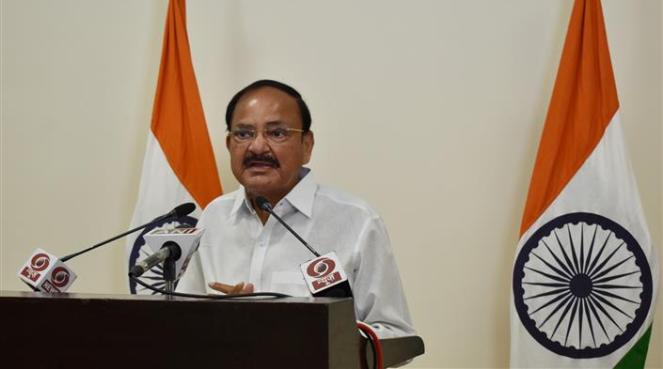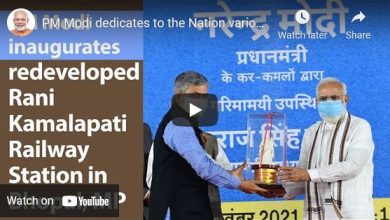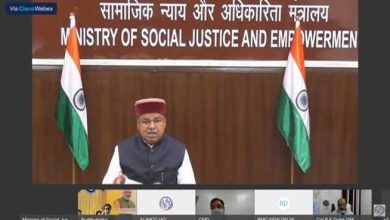Vice President calls for including a ‘child-centric’ approach in our response to climate change

The Vice President, Shri M. Venkaiah Naidu today called for including a ‘child-centric’ approach in our response to climate change. He wanted the child rights to be interwoven into key national climate change and adaptation strategies, policies and planning documents.
The Vice President was addressing an online webinar- ‘Climate Parliament with Children’ organized by the ‘Parliamentarians’ Group for Children’ on the occasion of World Children’s Day today. The event aims to facilitate interaction between the parliamentarians and children on the crucial topic of climate change.
Recognizing that the children of today are far better informed than previous generations, he called for involving them in the conversation around climate change. He emphasised the need to raise awareness on climate change, its impacts and mitigation measures in schools and grassroots level to make the children change agents and transformational leaders of the future.
Stating WHO data, Shri Naidu said climate change will cause lakhs of additional deaths every year and majority of these deaths will occur among the children who are more susceptible to illness, injuries and malnutrition. “Children (0-14 year) form a quarter of the world’s population and they are one of the largest and most vulnerable groups that will be impacted by climate change”, he warned.
Referring to the increasing number of extreme weather events such as droughts, floods, cyclones, wildfires, the Vice President said that continuous emission of greenhouse gases has done great damage to earth’s environment and its consequences threaten the very existence of humanity.
Describing the consequences of global warming such as increase in heat stress and vector-born diseases, the Vice President warned that changing climate will also threaten world’s food security leading to hunger and malnutrition. Children will be the worst affected, he added.
Specifically mentioning the impact of climate change and disasters on children, Shri Naidu listed the malnutrition, closure of schools, increase in child labour and psychological trauma as possible results. “These conditions would be particularly severe in children living in poor and under-served areas”, he cautioned.
Recalling his childhood days, Shri Naidu said that he had an opportunity to grow up in the clean air and a healthy environment which should not be denied to the kids today.
Stressing the need for sustainability, Shri Naidu called for striking the necessary balance between development and environment. We have to preserve scarce resources and care for the generations to come, he said.
Reiterating the expert view that we only have a decade or so to influence the course of climate change before its adverse impacts become irreversible, the Vice President called upon the policymakers, leaders, parents and grandparents to collectively work for addressing this dire situation and usher a healthier environment for our children. “We cannot allow apathy or inaction to jeopardize our future”, he added.
In this regard, he appreciated the Government for several initiatives for environmental protection such as- signing of the Paris Climate Agreement, focus on installation of renewable energy and reduction in India’s emission intensity among others.
Shri Naidu also expressed concerns over plastic pollution, especially in oceans, where nearly 50% of single-use plastic products end up, killing marine life and entering the human food chain. He asked everyone to support the Prime Minister’s call for eradicating single-use plastic from the country by 2022.
Calling for building a safer world for the children, The Vice President said that climate change is a direct threat to a child’s ability to survive, grow, and thrive. He opined that children themselves can become the changemakers with support from peers, parents and society. “If you catch up with the children, you catch up with the society”, he said and cited the example of Swachh Bharat Mission where children are trying to bring the change.
Stressing the importance of ‘nature’ and ‘culture’ in one’s life, Shri Naidu said that we must be friendly with the nature and feel proud of our culture. “Our forefathers have given us great civilizational values such as Vasudhaiva Kutumbakam”, he said and called upon everyone to follow them. This value system should not be allowed to erode, he insisted.
Shri Naidu appreciated the Union Minister of Women and Child Development, Smt. Smriti Irani for working hard to bring positive change in the lives of Indian women and children. He also complimented the Member of Parliament, Smt Vandana Chavan for raising the issues of children’s rights through the Parliamentarians’ Group for Children.
Smt. Smriti Irani, the Union Minister of Women and Child Development, Smt Vandana Chavan, Convener of Parliamentarians’ Group for Children, Dr. Yasmin Ali Haque, UNICEF representative for India, several MPs, child rights activists and children were among those who participated in the virtual event.
Following is the full text of the speech –
“Sisters and brothers,
Please accept my warm greetings on World Children’s Day today.
I am very pleased to join you at this ‘Climate Parliament with Children’ which aims to facilitate interaction between the parliamentarians and children on the crucial topic of climate change.
I appreciate the ‘Parliamentarians’ Group for Children’ for this novel initiative. Timing of the event is also very apt as the whole world is battling a pandemic caused by coronavirus and also a number of disruptions in weather pattern.
Climate change is a real challenge. We should recognize it and take urgent action to mitigate the negative impact on our lives.
We are witnessing an increasing number of extreme weather events such as droughts, floods, cyclones, wildfires. We have been rather reckless in our rush for so-called development. We have ignored the need to preserve and protect nature. Continuous pumping of billions of tons of greenhouse gases since the industrial revolution has done great damage to earth’s environment. As a consequence, we have now to cope with a massive challenge that threatens the very existence of humanity.
Estimates by the WHO suggest that a quarter of a million people per year are likely to die between 2030 and 2050 due to various factors associated with climate change. What is even more alarming is the fact that vast majority of these deaths will occur among the children who are more susceptible to illness, injuries and malnutrition.
As per United Nations Population Fund, there are close to 2 billion children in the age group of 0-14 – a quarter of the world’s population. These children are one of the largest and most vulnerable groups that will be impacted by climate change.
So, in a way, we are putting our future also at grave risk. Various studies have demonstrated that rise in the earth’s temperature will lead to heat stress and vector-born diseases such as malaria and diarrhea. Changing climate will also threaten world’s food security leading to hunger and malnutrition. Children will be the worst affected.
A study by Monash University in Melbourne has predicted that there would be climate-related stunting, malnutrition and lower IQ in children within the coming decades. Climate change and environmental degradation as well as disasters also impact the children in many other ways such as- closure of schools, forcing young kids into child labour, emotional and psychological trauma. These conditions would be particularly severe in children living in poor and under-served areas.
Dear friends,
When I look back at my childhood and compare it with my grandchildren’s, I very often think of how lucky I was. Sure, we did not have the latest gadgets like children these days have, neither the world at our fingertips via internet. But one thing we had and could rely on, was clean air and a healthy environment to grow up in. I am not sure if the kids today are able to grow up in such an environment.
My esteemed colleagues present here today would agree with me that India and the World are at a critical juncture. As policymakers, leaders, upstanding members of the society, parents and grandparents, it is us, who can salvage the dire situation and usher a healthier environment for our children. We cannot allow apathy or inaction to jeopardize our future.
Climate experts estimate that we merely have only 10 to 12 years to influence the course of climate change before its adverse impacts become irreversible. In a way, the next few years are our only chance at ensuring that our future generations have a chance to lead healthy lives.
In this context, my dear colleagues, I am pleased to note that the Government of India has taken a number of steps to protect the future of our children. Recognizing that climate change is a direct threat to a child’s ability to survive, grow, and thrive, India has become signatory to the Paris Climate Agreement and is on track to honour its commitments.
Further, during the UN’s Climate Week in New York in September 2019, our Prime Minister committed to a target of 450 gigawatts (GW) of renewable energy installations, likely by 2030. This is equivalent to five times more than India’s current installed renewable energy capacity and larger than the size of India’s electricity grid size in 2019 (362 GW).
India’s emission intensity has reduced by 21% over the period 2005-2014. Our efforts towards a better future for India and its children are not just ambitious, but also practical. Today, we are on track to not only achieve but are likely to exceed our non-fossil fuel electricity capacity. I am glad that these steps are being taken. These are the kind of initiatives all countries around the world must take.
Concerns are growing worldwide about plastic pollution, especially in oceans, where nearly 50% of single-use plastic products end up, killing marine life and entering the human food chain. Our Prime Minister Narendra Modi has called upon people to eradicate single-use plastic from the country by 2022 and we are counting on children to be the changemakers.
As a developing nation, we have had to juggle with multiple priorities including sustained economic growth for millions of own people while ensuring we reduce air pollution and protect the people, especially the most vulnerable, from the negative impact of climate change. We have to strike the necessary balance. We have to preserve scarce resources and care for the generations to come.
On this day in the year 1959, the United Nations General Assembly (UNGA) adopted the Declaration on the Rights of Children and this year marks the 71st anniversary of the historic event. Child rights should be interwoven into key national climate change and adaptation strategies, policies and planning documents. Our response to climate change needs to include a ‘child-centric’ approach. And to do this, the best way is through platforms like this.
I think that the children of today have a far greater access to information than we were as children. The children of today have a sense of urgency and ownership that I have never seen in our previous generations. Through support systems like parents, peers and their schools, children today are far more involved in the conversation around climate change. This is a very positive development.
The need of the hour is to raise awareness on the important issue of climate change, its impacts and mitigation measures in schools and grassroots level to make our children change agents and transformational leaders of the future.
I am happy to open the 2020 Climate Parliament with Children and look forward to hearing what our young leaders have to say.
I am keen to hear their perspectives on this enormous challenge.
Let us together, create a new, safer world, that caters to the best interests of children in India and balances development with environmental protection.
In the end, I must commend you all for coming together for this noble cause of protecting the environment and the future generation. I appreciate the Union Minister of Women and Child Development, Smt. Smriti Irani who has been working hard to bring a positive change in the lives of Indian women and children.
I compliment the Member of Parliament, Smt Vandana Chavan Ji for constantly raising the issues of children’s rights through the Parliamentarians’ Group for Children (PGC). I am pleased that Dr. Yasmin Ali Haque, UNICEF representative and her team have been actively collaborating with Government of India in creating a better world for children.


